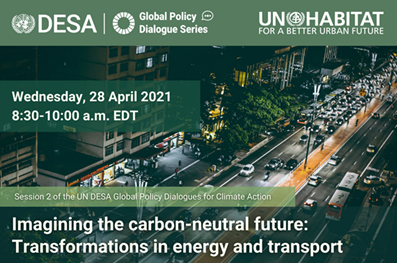ECOSF participated in a webinar on Imagining the Carbon-neutral Future: Transformations in Energy and Transport organized by UN DESA
Go Back

 UN Department of Economic and Social Affairs (UN DESA) is hosting a four-part series to discuss ways the world can place climate action at the heart of recovering better from the COVID-19 crisis. As part of UN DESA’s Global Policy Dialogues for Climate Action, a dialogue on Imagining the Carbon-neutral Future: Transformations in Energy and Transport was organized on 28 April 2021. This session was organized in collaboration and support of UN-Energy and UN-Habitat.
UN Department of Economic and Social Affairs (UN DESA) is hosting a four-part series to discuss ways the world can place climate action at the heart of recovering better from the COVID-19 crisis. As part of UN DESA’s Global Policy Dialogues for Climate Action, a dialogue on Imagining the Carbon-neutral Future: Transformations in Energy and Transport was organized on 28 April 2021. This session was organized in collaboration and support of UN-Energy and UN-Habitat.
The session brought together leading voices in the fields of clean energy and sustainable transport with experts. The objective of holding this event was to discuss practical solutions and ways to reform these systems minimizing their effect on the environment, in the context of recovering from the COVID-19 pandemic. Cross-cutting issues such as financing, governance, gender, data and statistics will be part of the discussion, as well as how the world can best make systemic transformations to a more sustainable world while leaving no one behind. On behalf of ECOSF, the President Prof. Dr Manzoor Hussain Soomro and Engr. Khalil Raza participated in the event.
The panellists of the webinar included:
- Maimunah Mohd Sharif, Executive Director, UN-Habitat
- Xiangkun (Elvis) Cao (China), Micro and nanoscale engineer
- Adekoyejo Kuye (Nigeria), project lead, Manamuz Electric LTD
- Bahareh Seyedi, Senior Sustainable Development Officer, UN DESA
- Kandeh Yumkella (Sierra Leone), former chair of UN-Energy and former Director-General of UNIDO
- Kristen Siemen (USA), Vice President of Sustainable Workplaces and Chief Su stainability Officer, General Motors
- Damilola Ogunbiyi, Special Representative of the Secretary-General for Sustainable Energy for All
The discussion during in webinar centered around following questions:
- How can we accelerate a global transition to clean energy, while ensuring universal energy access, especially in least developed countries, landlocked developing countries and small island developing States?
- What policies should Governments undertake?
- What are some of the necessary means and tools to ensure policies are put into practice and deliver our promises of the Paris Agreement?
- How do we ensure that the energy transition is inclusive and equitable for women?